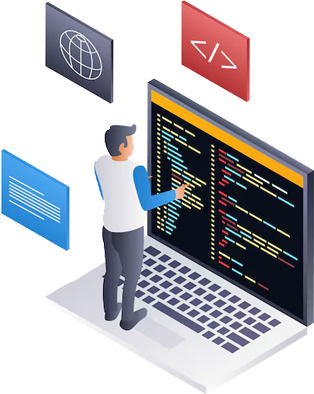Java

Java enterprise application development
Java is a widely used object-oriented programming language and software platform that runs on billions of devices, including notebook computers, mobile devices, gaming consoles, medical devices and many others. The rules and syntax of Java are based on the C and C++ languages.
One major advantage of developing software with Java is its portability. Once you wrote code for a Java program on a notebook computer, it can be easily moved to a mobile device
Take 2-Days of Free Demo Classes!
Advanced Java programming techniques
If you are an enterprise application developer, you know what Java is and it’s likely that your organization already has thousands, even millions, of production line code written in Java. You likely need some level of Java expertise to allow you to troubleshoot, maintain and upgrade your existing codebase.
However, it would be a mistake to view Java only in terms of legacy applications. The Java language forms the heart of the Android operating system, which powers by far the largest share of the world’s smartphones. Java is also among the most popular languages for machine learning and data science applications. Its robustness, ease of use, cross-platform capabilities and security make Java the language of choice for internet solutions in many enterprise shops.

Modules of the Course
Module: 1
Introduction:
- What Is Java
- Need of Programming Language
- Features Of Java
- Simple Java Program & It’s Explanation
- What Happens To Java Code
- Difference Between JVM/JRE/JDK
- Valid Main Method Syntax
Module: 2
Fundamentals:
- Identifier
- Literal
- Data Types
- Variables
- Keyword
- Operator
- Conditional Statement
Module: 3
Operators:
- Unary operator
- Arithmetic operator
- Shift operator
- Relational operator
- Bitwise operator
- Logical
- Ternary operator
- Assignment operator
Module: 4
Control Statements:
- If.else
- Switch
- For/For each
- While/do while
Module: 5
Function & Arrays:
- What is function
- Need of function
- Types of function
- Array
- Types of array
Module: 6
Oops:
- Object
- Class
- Constructor
- Methods
- Inheritance
- Polymorphism
- Interface
- Abstraction
- Encapsulation
Module: 7
Collection Framework:
- Introduction
- Collection vs collections
- Legacy classes
- List
- Queue
- Map
- Set
- Iterator
Module: 8
Exception Handling:
- Errors vs Exception
- Try/Catch
- Throw
- Throws
- Finally
Module: 9
MultiThreading:
- Thread
- Life cycle of thread
- Ways of creating thread
- Thread scheduler
- Interrupting methods
- Synchronization
- Deadlock
Career Opportunities After Java Programming

What you think Java Programming offers you
- Software Developer Roles
- Java Programmer
What actually Java Programming offers you
- Android Developer
- Backend Developer
- Database Administrator
- Application Developer
- Software Engineer
Why Choose Us
- Experienced Faculty
- Great Training Environment
- Internship Opportunities
- Placement Assistance
- Industrial Training With Live Industrial Projects
- Internationally Certified Programs


